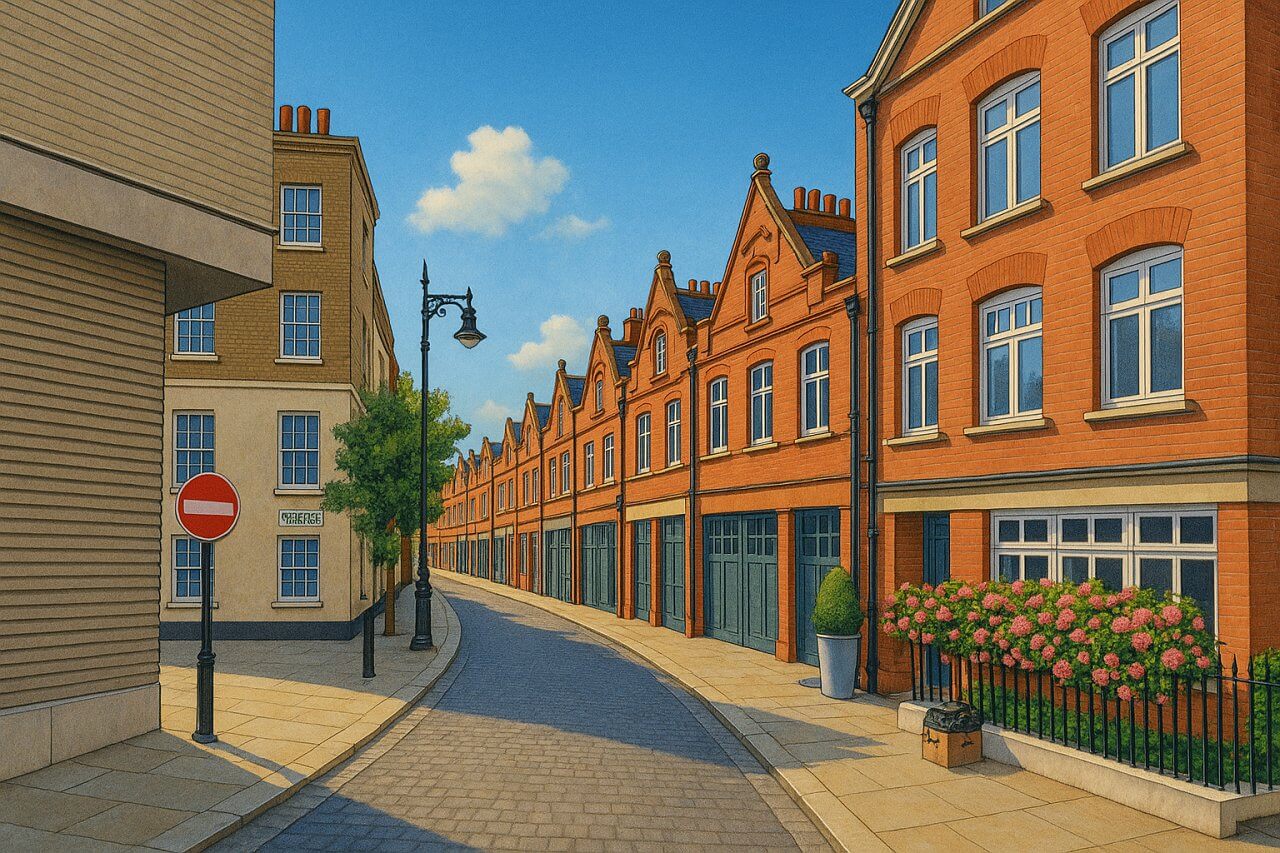
Bourdon Street, London
Bourdon Street is a quiet, characterful street in the heart of Mayfair, within the City of Westminster, London. It runs in an L-shape, connecting Davies Street on its western end to Grosvenor Hill on its eastern flank. Notably, Grosvenor Hill forms a loop and reconnects with Bourdon Street at a T-junction. At its northern tip, a discreet pedestrian passage offers access to Grosvenor Street, just moments from the boutiques and offices that define this prestigious part of the West End.
Street Layout and Character
Bourdon Street is narrow and largely residential, with a mix of period façades and more contemporary developments. The street retains a sense of old-world Mayfair charm, with red-brick mansion blocks and discreet security entrances typical of high-end London residences. It is peaceful and largely trafficked by locals and delivery vehicles. The pedestrianised passageway leading north to Grosvenor Street makes it a convenient route for foot traffic between Davies Street and the broader Mayfair grid.
Surrounding Streets and Connections
The street is flanked by Davies Street to the west, which leads north to Bond Street Station and south toward Berkeley Square. To the east lies Grosvenor Hill, home to art galleries and elegant office buildings. A short walk north connects to Grosvenor Street, while New Bond Street lies nearby, offering world-famous luxury retail. The location makes Bourdon Street ideal for those seeking proximity to central Mayfair’s elegance without the bustle of the main thoroughfares.
History and Etymology
Bourdon Street was laid out in the 18th century during the development of the Grosvenor Estate, which transformed Mayfair from fields into one of London’s most elite districts. The street's name is believed to derive from Captain William Bourdon, a historical figure associated with the early leases and land transactions of the estate. Like many Mayfair streets, its identity was shaped by its proximity to the grand squares and aristocratic homes that defined the area’s growth through the Georgian and Victorian eras.
Nearby Attractions and Points of Interest
Bourdon Street is close to a number of cultural and commercial attractions. Just around the corner is Gagosian Gallery on Grosvenor Hill, one of the world’s most prestigious contemporary art galleries. Berkeley Square is less than five minutes away, providing green space, cafés, and a charming market atmosphere. Also within walking distance are:
- Royal Academy of Arts
- New Bond Street luxury shops
- Claridge’s Hotel
- Mayfair’s private member clubs
These landmarks give the street an air of sophistication and exclusivity, even though Bourdon Street itself is relatively low-profile.
Real Estate and Property Values
As of mid-2025, residential properties on Bourdon Street command premium prices typical of Mayfair. One-bedroom flats typically range from 600 to 800 sq ft (56–74 sq m) and are valued at around £1.5 to £2.5 million. Larger two- or three-bedroom apartments (up to 1,500 sq ft or 139 sq m) can fetch between £3.5 and £6 million depending on amenities and floor level.
Rental values are equally high. A one-bedroom flat may rent for £1,000–£1,500 per week, while two-bedrooms may command £2,000 per week or more. These figures place Bourdon Street well above average London prices, reflecting the prestige of Mayfair and the Grosvenor Estate.
Transport and Accessibility
Bond Street Station is the nearest London Underground Station, located a short walk to the north. It is served by the Jubilee and Central lines and the Elizabeth Line, offering fast links across London. Marble Arch Station, on the Central Line, is also within walking distance via Oxford Street.
Several bus routes serve the area, with stops along Davies Street and Grosvenor Street providing connections to Oxford Circus, Victoria, and Paddington. Routes include the 7, 10, 98, and 390. These transport options ensure Bourdon Street is well-connected despite its secluded ambience.
Fun Fact
Bourdon Street once housed the rear entrance to the Mayfair Carriage Company, a firm known in the early 20th century for building luxury motorcar bodies for Rolls-Royce and Bentley. Although long gone, the site’s industrial past contrasts with the quiet residential character it exhibits today.
Quick Facts
- Location: Mayfair, City of Westminster, London
- Nearby Streets: Davies Street, Grosvenor Hill, Grosvenor Street
- Historic Origin: 18th-century Grosvenor Estate development
- Street Name Origin: Likely named after Captain William Bourdon
- Main Attractions: Gagosian Gallery, Berkeley Square, luxury retail on Bond Street
- Property Values (2025): £1.5m–£6m for flats (600–1,500 sq ft)
- Nearest Tube Stations: Bond Street (Central, Jubilee, Elizabeth Lines), Marble Arch
- Nearby Bus Routes: 7, 10, 98, 390 on Grosvenor Street and Davies Street
- Character: Quiet, high-end, residential street with art and history
- Fun Fact: Former site of the Mayfair Carriage Company’s rear entrance
References
- Grosvenor Estate – Our History
- Rightmove – Bourdon Street Property Listings
- Gagosian Gallery, Grosvenor Hill
Map of Bourdon Street, London
 Painting of Bourdon Street, London
Painting of Bourdon Street, London